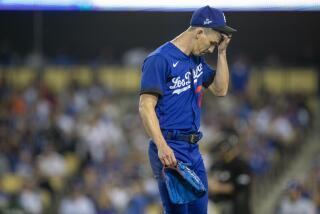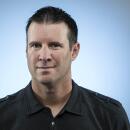Coroner Cites Ephedrine Link
- Share via
An over-the-counter dietary supplement containing the stimulant ephedrine was probably a contributing factor in the death of Baltimore Oriole pitching prospect Steve Bechler, a coroner said Tuesday.
Bechler had been taking three capsules each morning of Xenadrine RFA-1, a weight-loss drug that contains ephedrine, which has been linked to heatstroke and heart trouble, Broward County (Fla.) medical examiner Joshua Perper said.
Bechler, 23, died of heatstroke Monday morning, less than 24 hours after collapsing during a conditioning run at the Orioles’ spring training complex in Fort Lauderdale. Bechler’s body temperature reached 108 degrees.
Initial autopsy findings indicated Bechler died from complications of heatstroke that caused multi-organ failure, Perper said. Conclusive toxicology reports will not be available for at least two weeks.
Bechler’s death stirred discussion of herbal supplements that are popular with athletes, bodybuilders and dieters. Ephedrine is banned by the NFL, NCAA and the International Olympic Committee. It is not banned by Major League Baseball.
John Tiedt, a Riverside attorney who represents plaintiffs in product-liability cases against supplement makers, said he was surprised Major League Baseball hasn’t followed the lead of the NFL. “Products like ephedrine do pose a serious risk to health, and because players are under pressure to perform, this should have been banned long ago,” he said.
Wes Siegner, an attorney for the Ephedra Education Council, said there should not be a rush to blame ephedrine as a culprit in Bechler’s death.
“Why did the medical examiner say what he did? I don’t think he probably has all the information he has to make the decision,” Siegner said. “We’ve had situations like this in the past where a medical examiner said, ‘I think it’s ephedra.’ Then when he got the facts, he went back and said the preliminary examination was not correct.”
Angel utilityman Shawn Wooten said he had taken products containing ephedrine without experiencing side effects. He found them to be effective in helping him control weight, he said, by increasing his energy level so he could complete additional workouts.
Wooten said ephedrine is available in various forms, in virtually every gym and health store.
“Go to any vitamin store,” he said. “Half the stuff there will be ephedrine.”
Wooten said he believed the federal government should not allow supplements to be sold without testing. Under the Dietary Supplement Health and Education Act of 1994, a dietary supplement manufacturer is responsible for ensuring its products are safe before they are marketed. The FDA takes action against dietary supplements only if it deems them to be unsafe after they reach the market.
“I don’t understand how something can be sold over the counter and not be researched,” Wooten said.
Nonetheless, Wooten said he would continue to use products containing ephedrine on occasion until scientific evidence concludes its use causes -- and is not simply associated with -- serious health risks.
“I’ll still take it until they ban it or they come out with information to show it’s harmful,” he said.
Dodger catcher Paul Lo Duca last season endorsed a sports-performance drink that had ephedrine in it. He no longer endorses the drink nor uses other dietary supplements because of what he said were health risks associated with taking them.
“I’m not doing it this year,” Lo Duca said. “I got off of all that stuff this off-season because I think it had a lot to do with my injuries. I just eliminated that stuff, but it was tough. Before, I’d take a couple of those and I could go to the gym and work out all day. It’s tough, but I feel healthier.
“It’s not good [stuff]. It makes your heart race. It gets you to the point where you’re body is tired, but you don’t feel tired, so you keep going, which is the problem. It’s a big problem. It’s a bad deal.”
Dodger team trainer Stan Johnston said the club advises players not to use ephedrine-based dietary supplements. It has been part of a team policy for three years because such products cause dehydration and increase heart rates, he said.
“We advise them it’s a product they shouldn’t use because of the things it will do to you,” Johnston said. “Some do listen and some don’t. For the people who do [use it], we continue to try to educate them. It’s an over-the-counter supplement, so you can’t control it. It’s not like medication that you can control.”
Ned Bergert, the Angels’ head trainer, said he encourages players to discuss any drugs, supplements or other products with the training staff before use. If the trainers are unfamiliar with a product, they consult experts and search for studies so players can be advised of the potential benefits and risks.
“We try and educate our players about all the different supplements,” he said.
Players, whose job security depends on performance, might learn about a potential performance-enhancing product at the gym, a store, on television or on the recommendation of a friend. About once every other month, Bergert said, a player will ask for an opinion about a product.
To those players asking about substances containing ephedrine, Bergert said, “I wouldn’t recommend taking it.”
Even accepted supplements carry risks. Creatine is a controversial but widely used product that shortens the recovery time for muscles, allowing players to lift weights more often and get stronger more quickly. There is a significant risk of dehydration, which can lead to serious illness.
“Creatine works,” Bergert said. “But, when you take it, you have to drastically increase your intake of clear fluids for your body to stay hydrated.”
Other teams reacted to Bechler’s death by reminding players of the importance of proper hydration. In Tampa, New York Yankee players took part in their first full-squad workout, then found in each of their lockers a copy of an article titled, “The Effect of Heat on Athletes.”
At Fort Lauderdale Stadium, where the flag was at half-staff, the Orioles resumed workouts.
While many were calling for baseball to reexamine its policy on ephedrine, neither Major League Baseball nor the players’ association was ready to comment on the issue.
“We’re going to wait until we know more about what happened,” baseball spokesman Rich Levin said.
Said union head Don Fehr: “I’m not going to say anything until after the funeral and the burial. It would be inappropriate.”
Meanwhile, Perper cited other factors besides ephedrine as contributors in Bechler’s death, including a history of borderline high blood pressure; liver abnormalities detected two years ago; warm, humid weather in the low 80s during Bechler’s workout; and a lack of solid food in his system the previous two days, the likely result of a diet.
“All of those factors converged together and resulted in the fatal heatstroke,” Perper said.
Pat Bechler told the Baltimore Sun her son had asthma when he was younger but hadn’t had a problem with it for several years. He did, however, have a history of struggling in hot conditions, she said.
“In high school, he had a couple heatstrokes,” she said.
Bechler checked into camp last Friday at 249 pounds, about 10 pounds above his listed weight. He was unable to complete running drills last Saturday and was scolded by Oriole Manager Mike Hargrove.
A bottle of Xenadrine was discovered in Bechler’s locker after he became ill. It was inadvertently thrown away by someone on the team, Perper said.
“They figured it’s not important,” he said.
Cytodyne Technologies, which makes Xenadrine, said in a statement that the recommended dosage was two capsules twice a day: “Xenadrine has been the subject of numerous clinical trials on people, which have conclusively demonstrated that the product is safe and effective when used as directed.”
*
Times staff writers Bill Shaikin and Jason Reid, and Associated Press contributed to this report.
More to Read
Sign up for Essential California
The most important California stories and recommendations in your inbox every morning.
You may occasionally receive promotional content from the Los Angeles Times.











